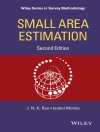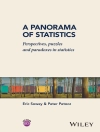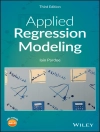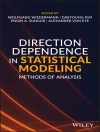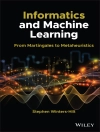Data analysis as an area of importance has grown exponentially, especially during the past couple of decades. This can be attributed to a rapidly growing computer industry and the wide applicability of computational techniques, in conjunction with new advances of analytic tools. This being the case, the need for literature that addresses this is self-evident. New publications are appearing, covering the need for information from all fields of science and engineering, thanks to the universal relevance of data analysis and statistics packages. This book is a collective work by a number of leading scientists, analysts, engineers, mathematicians and statisticians who have been working at the forefront of data analysis. The chapters included in this volume represent a cross-section of current concerns and research interests in these scientific areas. The material is divided into three parts: Financial Data Analysis and Methods, Statistics and Stochastic Data Analysis and Methods, and Demographic Methods and Data Analysis- providing the reader with both theoretical and applied information on data analysis methods, models and techniques and appropriate applications.
विषयसूची
Preface xiii
Part 1 Financial Data Analysis and Methods 1
Chapter 1 Forecasting Methods in Extreme Scenarios and Advanced Data Analytics for Improved Risk Estimation 3
George-Jason SIOURIS, Despoina SKILOGIANNI and Alex Karagrigoriou
1.1 Introduction 3
1.2 The low price effect and correction 6
1.2.1 Percentage value at risk and low price correction 9
1.2.2 Expected Percentage Shortfall (EPS) and Low Price Correction 12
1.2.3 Adjusted Evaluation Measures 14
1.2.4 Backtesting and Method’s Advantages 15
1.3 Application 17
1.3.1 The Alpha warrant 17
1.3.2 The ARTX stock 24
1.4 Conclusion 28
1.5 Acknowledgements 30
1.6 References 30
Chapter 2 Credit Portfolio Risk Evaluation with Non-Gaussian One-factor Merton Models and its Application to CDO Pricing 33
Takuya FUJII and Takayuki SHIOHAMA
2.1 Introduction 33
2.2 Model and assumptions 36
2.3 Asymptotic evaluation of credit risk measures 40
2.4 Data analysis 44
2.5 Conclusion 48
2.6 Acknowledgements 48
2.7 References 48
Chapter 3 Towards an Improved Credit Scoring System with Alternative Data: the Greek Case 51
Panagiota GIANNOULI and Christos E. KOUNTZAKIS
3.1 Introduction 51
3.2 Literature review: stages of credit scoring 52
3.3 Performance definition 53
3.4 Data description 54
3.4.1 Alternative data in credit scoring 54
3.4.2 Credit scoring data set 54
3.4.3 Data pre-processing 55
3.5 Models’ comparison 56
3.6 Out-of-time and out-of-sample validation 58
3.7 Conclusion 59
3.8 References 59
Chapter 4 EM Algorithm for Estimating the Parameters of the Multivariate Stable Distribution 61
Leonidas SAKALAUSKAS and Ingrida VAICIULYTE
4.1 Introduction 61
4.2 Estimators of maximum likelihood approach 63
4.3 Quadrature formulas 67
4.4 Computer modeling 68
4.5 Conclusion 71
4.6 References 71
Part 2. Statistics and Stochastic Data Analysis and Methods 75
Chapter 5 Methods for Assessing Critical States of Complex Systems 77
Valery ANTONOV
5.1 Introduction 77
5.2 Heart rate variability 78
5.3 Time-series processing methods 80
5.4 Conclusion 87
5.5 References 88
Chapter 6 Resampling Procedures for a More Reliable Extremal Index Estimation 89
Dora PRATA GOMES and M. Manuela NEVES
6.1 Introduction and motivation 89
6.2 Properties and difficulties of classical estimators 92
6.3 Resampling procedures in extremal index estimation 93
6.3.1 A simulation study of mean values and mean square error patterns of the estimators 94
6.3.2 A choice of δ and k: a heuristic sample path stability criterion 96
6.4 Some overall comments 98
6.5 Acknowledgements 99
6.6 References 99
Chapter 7 Generalizations of Poisson Process in the Modeling of Random Processes Related to Road Accidents 103
Franciszek GRABSKI
7.1 Introduction 103
7.2 Non-homogeneous Poisson process 104
7.3 Model of the road accident number in Poland 106
7.3.1 Estimation of model parameters 107
7.3.2 Anticipation of the accident number 108
7.4 Non-homogeneous compound Poisson process 109
7.5 Data analysis 113
7.6 Anticipation of the accident consequences 113
7.7 Conclusion 116
7.8 References 117
Chapter 8 Dependability and Performance Analysis for a Two Unit Multi-state System with Imperfect Switch 119
Vasilis P. KOUTRAS, Sonia MALEFAKI and Agapios N. PLATIS
8.1 Introduction 120
8.2 Description of the system under maintenance and imperfect switch 122
8.3 Dependability and performance measures 124
8.3.1 Transient phase 125
8.3.2 Asymptotic analysis 128
8.4 Optimal maintenance policy 129
8.4.1 Optimal maintenance policy for maximizing system availability 130
8.4.2 Optimal maintenance policy for minimizing total expected operational cost 130
8.4.3 Optimal maintenance policy for multi-objective optimization problems 131
8.5 Numerical results 132
8.5.1 Transient and asymptotic dependability and performance 132
8.5.2 Optimal asymptotic maintenance policies implemented in the transient phase 143
8.6 Conclusion and future work 147
8.7 Appendix 148
8.8 References 152
Chapter 9 Models for Time Series Whose Trend Has Local Maximum and Minimum Values 155
Norio WATANABE
9.1 Introduction 155
9.2 Models 156
9.2.1 Model 1 156
9.2.2 Model 2 158
9.3 Simulation 159
9.4 Estimation of the piecewise linear trend 161
9.5 Conclusion 164
9.6 References 165
Chapter 10 How to Model the Covariance Structure in a Spatial Framework: Variogram or Correlation Function? 167
Giovanni PISTONE and Grazia VICARIO
10.1 Introduction 167
10.2 Universal Krige setup 168
10.3 The variogram matrix 170
10.4 Inverse variogram matrix Γ −1 173
10.5 Projecting on span (1) ⊥ 177
10.6 Elliptope 179
10.7 Conclusion 182
10.8 Acknowledgements 182
10.9 References 183
Chapter 11 Comparison of Stochastic Processes 185
Jesús Enrique GARCÍA, Ramin GHOLIZADEH and Verónica Andrea GONZÁLEZ-LÓPEZ
11.1 Introduction 185
11.2 Preliminaries 186
11.3 Application to linguistic data 191
11.4 Conclusion 195
11.5 References 196
Part 3 Demographic Methods and Data Analysis 197
Chapter 12 Conjoint Analysis of Gross Annual Salary Re-evaluation: Evidence from Lombardy ELECTUS Data 199
Paolo MARIANI, Andrea MARLETTA and Mariangela ZENGA
12.1 Introduction 199
12.2 Methodology 201
12.2.1 Coefficient of economic valuation 202
12.3 Application and results 204
12.4 Conclusion 211
12.5 References 212
Chapter 13 Methodology for an Optimum Health Expenditure Allocation 215
George MATALLIOTAKIS
13.1 Introduction 215
13.2 The Greek case 216
13.3 The basic table for calculations 219
13.4 The health expenditure in hospitals 221
13.5 Conclusion 221
13.6 References 222
Chapter 14 Probabilistic Models for Clinical Pathways: The Case of Chronic Patients 225
Stergiani SPYROU, Anatoli KAZEKTSIDOU and Panagiotis BAMIDIS
14.1 Introduction 225
14.2 Models and clinical practice 227
14.3 The Markov models in medical diagnoses 228
14.3.1 The case of chronic patients 229
14.3.2 Results 231
14.4 Conclusion 232
14.5 References 233
Chapter 15 On Clustering Techniques for Multivariate Demographic Health Data 235
Achilleas ANASTASIOU, George MAVRIDOGLOU, Petros HATZOPOULOS and Alex KARAGRIGORIOU
15.1 Introduction 235
15.2 Literature review 236
15.3 Classification characteristics 237
15.3.1 Distance measures 238
15.3.2 Clustering methods 239
15.4 Data analysis 240
15.4.1 Data 240
15.4.2 The analysis 242
15.5 Conclusion 249
15.6 References 249
Chapter 16 Tobacco-related Mortality in Greece: The Effect of Malignant Neoplasms, Circulatory and Respiratory Diseases, 1994–2016 251
Konstantinos N. ZAFEIRIS
16.1 Introduction 251
16.1.1 Smoking-related diseases 253
16.2 Data and methods 254
16.3 Results 256
16.3.1 Life expectancy at birth 256
16.3.2 Effects of the diseases of the circulatory system on longevity 258
16.3.3 Effects of smoking-related neoplasms on longevity 261
16.3.4 Effects of respiratory diseases on longevity 265
16.4 Discussion and conclusion 268
16.5 References 272
List of Authors 277
Index 281
लेखक के बारे में
Andreas Makrides is Associate Lecturer of Statistics at the University of Central Lancashire, Cyprus (UClan) and conducted postdoctoral research at the Laboratoire de Mathematiques Raphael Salem, Universite de Rouen, France. Alex Karagrigoriou is Professor of Probability and Statistics at the University of the Aegean, Greece. He is also the faculty?s Head of Graduate Studies and Director of the in-house Laboratory of Statistics and Data Analysis. Christos H. Skiadas is former vice-Rector at the Technical University of Crete, Greece and founder of its Data Analysis and Forecasting Laboratory. He continues his research in Man Lab, in the faculty?s Department of Production Engineering and Management.






